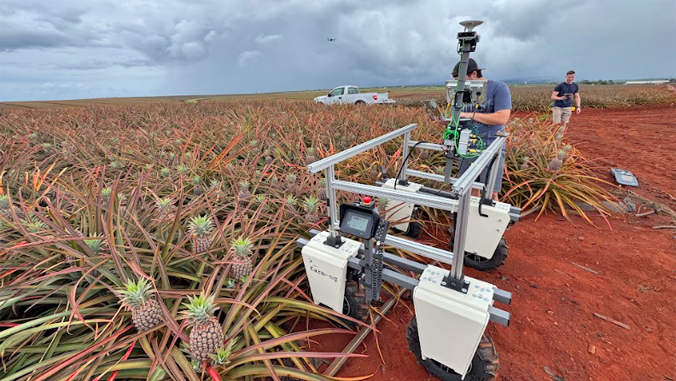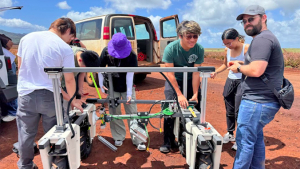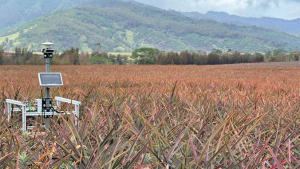

Armed with a drone, robot and vision for the future of farming, a team of University of Hawaiʻi at Mānoa undergraduate students developed an AI-powered system to count and size pineapples in the field—earning them the international Farm Robotics Challenge 2025’s Excellence in Productivity (Air) award and a $10,000 prize.

“At first it was a bit scary going up against all those schools, but I believe we had an advantage,” said junior Rona Lei Duldulao, the lead student organizer of “Team ʻĀina,” made of College of Engineering and College of Natural Sciences students. “Hawaiʻi agriculture is very unique, and the climate here makes it convenient to do agriculture projects.”
The team competed against 34 student teams from the U.S., Asia and Europe to find solutions for problems faced by farmers worldwide. The students chose to use AI and automation to help farmers in Hawaiʻi who are facing a worker shortage.
“We went to Dole Plantation and we learned how much work goes into growing these pineapples,” said Duldulao. “We were very interested in helping the farmers with this labor intensive process and making their work easier for them, because it’s very hard standing out in the sun and doing everything with their hands.”
A team from UH Maui College also competed with a project focused on utilizing drones and robotics for sustainable farming in Hawaiʻi.
By land and air

The UH Mānoa students decided to attack the problem by land and air, with support from faculty advisors led by Huaijin Chen, assistant professor of computer science. They developed software and hardware for a drone and robot duo to survey Dole’s pineapple fields. The drone uses cameras and AI to count the number of pineapples and track changes over time. The robot’s vision algorithm creates 3D images of individual fruit to measure the size and shape of each pineapple.
“By predicting the size of the fruit and its flowering, a farm can better manage their harvesting, planning, marketing and sales of pineapples,” said Robert Paull, a team advisor and professor at the College of Tropical Agriculture and Human Resilience.
The commercial uses of this system are promising.

“I believe this AI-powered duo can be scaled up to help manage other crops in many different farm settings,” said Chen.
Team members include Duldulao, Lucas Horsman, Wilson Huynh, Erik Bendickson, Christian Komo, Zadon Padello, Mikhail Shkaralevich and Tyler Mak.
Chen and College of Tropical Agriculture and Human Resilience faculty members Paull, Ryan Kurasaki and Daniel Jenkins advised the team. Dole Plantation provided in-kind support and help with the project’s video. The College of Engineering, the College of Natural Sciences and the College of Tropical Agriculture and Human Resilience provided seed funding for the project.
The international competition was organized by the University of California and the AI Institute for Next Generation Food Systems, part of the U.S. Department of Agriculture and National Science Foundation’s National Institute of Food and Agriculture program.

